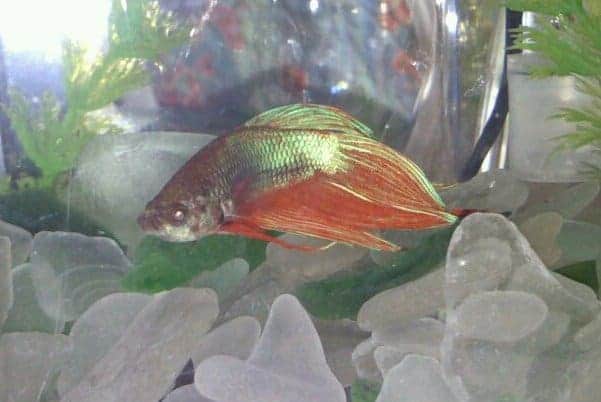Betta fish (Betta splendens)
Also known as Siamese fighting fish, betta fish are a common pet fish. The males are known for being very aggressive towards other males and other combative fish; however, females are able to cohabitate peacefully. Do not combine male and female betta fish! Beta fish come in a variety of bright colors and have long, sweeping fins, however, wild varieties of betta fish are brown and green with short fins. Betta fish will usually live about 2-4 years with proper housing and nutrition. Although they are usually marketed to live in small fish bowls, it is recommended that they are housed in a larger tank (5-10 gallons) with proper filtration and regular water changes. If you are combining multiple females, the tank size should be approximately 5-10 gallons of water per fish.
Where do betta fish come from?
Bettas originate from Thailand, but can also be found in Indonesia, Vietnam, Laos, Cambodia and Malaysia. Wild bettas can be found in shallow, freshwater areas including streams, ponds and marshes. These habitats can vary wildly in their oxygen availability, so bettas have adapted to using oxygen within the air to breathe through their specialized labyrinth organ. This organ is attached to their gills and can provide additional oxygen when water conditions are less than ideal. Labyrinth fishes are classified as the Anabantoidei suborder including bettas and many gourami species.
Although they are mostly captive-bred animals, some wild bettas are farmed overseas. However, some of their native habitat is affected by pollution and human activity for farming. Bettas are currently listed as vulnerable on the IUCN Red List. No matter what species of fish you are interested in adopting, it is always important to know their status and where they originate from.

How to care for your betta fish
Here are some helpful articles to take good care of your betta fish:
- Betta Fish – Standard of Care
- Betta Fish Basics Webinar
- 2 Steps to Quickly Help a Sick Betta
- How NOT To Kill Your Betta Fish Guide
Need a handy guide? Check out our Betta Help Page

